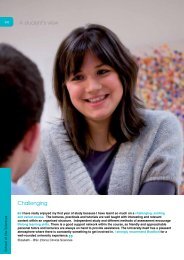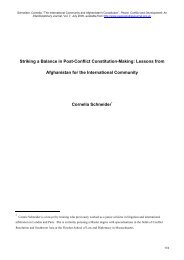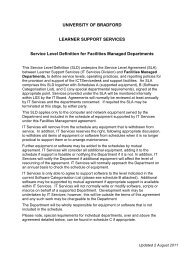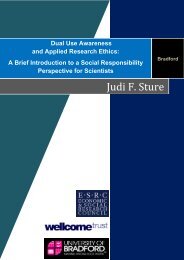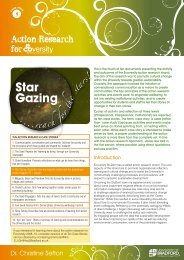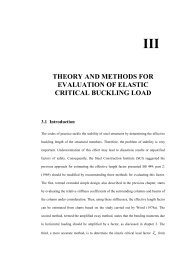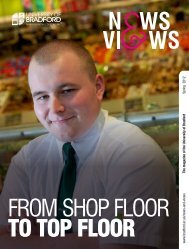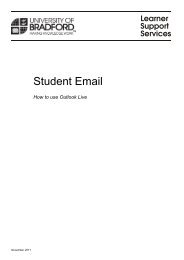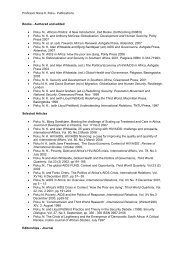Optometry course brochure - University of Bradford
Optometry course brochure - University of Bradford
Optometry course brochure - University of Bradford
You also want an ePaper? Increase the reach of your titles
YUMPU automatically turns print PDFs into web optimized ePapers that Google loves.
SCHOOL OF OPTOMETRY<br />
AND VISION SCIENCE<br />
<strong>Optometry</strong><br />
BSc (Hons) 3 years full-time
<strong>Optometry</strong><br />
CONTENTS<br />
The BSc (Hons) in <strong>Optometry</strong> 1<br />
Special features 2<br />
Course content 3<br />
Course structure diagram 4<br />
Your career in optometry 5<br />
Admission 6<br />
Postgraduate activities 8<br />
The student view 9<br />
<strong>University</strong> life 11<br />
The City <strong>of</strong> <strong>Bradford</strong> 12<br />
How to find us 13<br />
Dean <strong>of</strong> the School <strong>of</strong> Life Sciences<br />
Pr<strong>of</strong>essor Richard Greene MBBS PhD MBA<br />
Head <strong>of</strong> the <strong>Bradford</strong> School <strong>of</strong> <strong>Optometry</strong><br />
and Vision Science<br />
Dr Jim Gilchrist BSc MPhil PhD Brad., FCOptom<br />
Admissions Tutors<br />
Dr Edward Mallen BSc PhD Aston, MCOptom<br />
Dr James Heron BSc PhD Brad, MCOptom<br />
We can arrange for this material to be transcribed into<br />
an accessible format such as Braille, large print, E-text<br />
(compatible with screen-reading s<strong>of</strong>tware) or digital<br />
audio such as CD. Please contact the <strong>Bradford</strong> School <strong>of</strong><br />
<strong>Optometry</strong> and Vision Science. Tel: 01274 236296.<br />
The <strong>University</strong> <strong>of</strong> <strong>Bradford</strong> -<br />
Confronting Inequality: Celebrating Diversity<br />
The <strong>University</strong> <strong>of</strong> <strong>Bradford</strong> is committed to promoting equality, diversity and an inclusive<br />
and supportive environment for students, staff and others closely associated with the<br />
<strong>University</strong> in conformity with the provisions <strong>of</strong> its Charter.<br />
Please address enquiries to:<br />
The Admissions Secretary (H36)<br />
<strong>Bradford</strong> School <strong>of</strong> <strong>Optometry</strong> and Vision Science<br />
<strong>University</strong> <strong>of</strong> <strong>Bradford</strong><br />
<strong>Bradford</strong><br />
West Yorkshire<br />
BD7 1DP<br />
Tel: 01274 236296<br />
Fax: 01274 309742<br />
Email: optometry-admissions@bradford.ac.uk<br />
Website: www.bradford.ac.uk/acad/lifesci/optometry<br />
If you are dialling from outside the UK, please use the code<br />
+44 1274 before the final six-figure number<br />
General Course Enquiries<br />
Course Enquiries Office<br />
Tel: 0800 073 1225<br />
Minicom: 01274 233685<br />
Fax: 01274 235585<br />
Email: <strong>course</strong>-enquiries@bradford.ac.uk
Optometrists do much more than supply spectacles and contact<br />
lenses. In the UK, optometry is part <strong>of</strong> the primary healthcare<br />
programme, and an optometric examination includes screening<br />
for signs <strong>of</strong> disease that may need medical attention. Conditions<br />
such as diabetes or high blood pressure, which may affect the<br />
eyes, are <strong>of</strong>ten first detected by an optometrist. Optometrists<br />
may also <strong>of</strong>fer specialist advice and treatment to patients having<br />
problems with low vision, binocular vision, and those with<br />
specific learning difficulties such as dyslexia. The broad range<br />
<strong>of</strong> responsibility <strong>of</strong> the optometrist is reflected in the breadth <strong>of</strong><br />
your studies, with the <strong>course</strong> evenly balanced between three<br />
elements: basic sciences (such as anatomy, physiology and<br />
optics), optometric studies, and clinical practice.<br />
<strong>Optometry</strong> requires a detailed understanding <strong>of</strong> the structure and<br />
functions <strong>of</strong> the human eye and visual system. The work calls for<br />
a high degree <strong>of</strong> accuracy, attention to detail, and a measure <strong>of</strong><br />
manual dexterity - all skills which you will have the opportunity to<br />
acquire during the <strong>course</strong>. You also need an interest and ability in<br />
scientific work, and an ability to work with people and to win their<br />
confidence.<br />
The BSc Honours in <strong>Optometry</strong><br />
www.bradford.ac.uk/acad/lifesci/optometry<br />
Our three-year <strong>Optometry</strong> <strong>course</strong> is designed to provide you with<br />
all the theoretical and practical knowledge and skills needed to<br />
become a qualified optometrist.<br />
The <strong>course</strong> is assessed by a combination <strong>of</strong> examinations and<br />
<strong>course</strong>work, with your final degree classification being based on<br />
assessments during the second and third academic years. The<br />
academic year is divided into two semesters (late September<br />
to January, and January to May). Each semester consists <strong>of</strong><br />
12 weeks <strong>of</strong> teaching, followed by a period for revision and<br />
assessment. You take six modules in each semester, twelve<br />
each year, and thirty-six over the full degree <strong>course</strong>.<br />
After graduation you will need to spend a further ‘pre-registration’<br />
year <strong>of</strong> training, under the supervision <strong>of</strong> a qualified optometrist,<br />
and pass pr<strong>of</strong>essional qualifying examinations. Graduates in<br />
optometry can look forward to excellent career prospects, with<br />
a 97% employment record for our 2008 graduates and the<br />
remaining 3% undertaking further study.<br />
A brief description <strong>of</strong> the syllabus and a <strong>course</strong> structure<br />
diagram can be found on the following pages. For more detailed<br />
information on the <strong>Bradford</strong> School <strong>of</strong> <strong>Optometry</strong> and Vision<br />
Science (including information on research and clinical facilities),<br />
please refer to our web pages at<br />
www.bradford.ac.uk/acad/lifesci/optometry<br />
Psychology <strong>Optometry</strong> 1
2<br />
Special Features<br />
• AN EMPHASIS ON CLINICAL PRACTICE<br />
• EXCELLENT TEACHING QUALITY<br />
• TEACHING BY QUALIFIED OPTOMETRISTS<br />
• WELL-EQUIPPED CLINICS<br />
AND LABORATORIES<br />
• THE EYE CLINIC<br />
• A GOOD RELATIONSHIP WITH LOCAL<br />
HOSPITALS AND THE COMMUNITY<br />
• JOBS AND CAREER OPPORTUNITIES<br />
• A FRIENDLY ATMOSPHERE<br />
• IDEALLY SITUATED<br />
An Emphasis on Clinical Practice<br />
Our Honours degree <strong>course</strong> in <strong>Optometry</strong><br />
prepares you for clinical practice. The<br />
emphasis is very much on the optometric<br />
service to patients, and the clinical<br />
content <strong>of</strong> the <strong>course</strong> begins in the first<br />
week and increases steadily through the<br />
three years <strong>of</strong> the programme.<br />
Excellent Teaching Quality<br />
The School <strong>of</strong> <strong>Optometry</strong> was awarded<br />
23/24 in a recent Subject Specialist<br />
Review <strong>of</strong> teaching quality - a grade<br />
regarded as excellent.<br />
Teaching by Qualified Optometrists<br />
We have a core staff <strong>of</strong> qualified<br />
optometrists, all with broad experience in<br />
optometric practice and teaching. Staff<br />
are also actively involved in academic<br />
research, with which you may become<br />
involved in your final year. The National<br />
Student Survey for 2007 voted <strong>Bradford</strong><br />
the top <strong>Optometry</strong> department in the<br />
UK and we maintained our high score<br />
in 2008.<br />
<strong>Optometry</strong><br />
Well-Equipped Clinics<br />
and Laboratories<br />
We <strong>of</strong>fer well-equipped clinics for eye<br />
examinations, detection <strong>of</strong> eye disease,<br />
ocular measurement and photography,<br />
and electrophysiological investigation.<br />
There are speciality clinics in contact<br />
lenses, binocular vision, low vision and<br />
diabetes, <strong>of</strong>fering treatment <strong>of</strong> difficulties<br />
in co-ordination <strong>of</strong> the two eyes, as well<br />
as the prescription and dispensing <strong>of</strong><br />
spectacles, contact lenses and low<br />
vision aids.<br />
The Eye Clinic<br />
Opened by HRH the Duke <strong>of</strong> Gloucester<br />
in October 1997, the eye clinic provides<br />
comprehensive optometric services <strong>of</strong> a<br />
high standard to <strong>University</strong> staff,<br />
students, their families and members <strong>of</strong><br />
the local community. It also supports<br />
local optometrists and other healthcare<br />
pr<strong>of</strong>essionals requiring diagnostic,<br />
consultative or treatment services.<br />
A Good Relationship with Local<br />
Hospitals and the Community<br />
You will regularly visit eye departments<br />
<strong>of</strong> local hospitals and receive tuition<br />
from senior ophthalmologists.<br />
Optometrists, hospital consultants,<br />
social workers, schools and general<br />
medical practitioners now frequently<br />
refer patients to the <strong>University</strong> for<br />
special investigation.<br />
Jobs and Career Opportunities<br />
With a 100% record for 2008 graduates<br />
going onto employment or further study, it<br />
is easy to see why our graduates are<br />
spoilt for choice. For career opportunities,<br />
see page 5.<br />
A Friendly Atmosphere<br />
With an intake <strong>of</strong> around 100<br />
undergraduate students per year, you can<br />
be sure <strong>of</strong> a close-knit group and an<br />
atmosphere conducive to serious but<br />
enjoyable study. Should you have any<br />
problems, your personal tutor will be on<br />
hand to help out.<br />
Ideally Situated<br />
Centrally located in the Richmond<br />
Building, you are only minutes from all the<br />
<strong>University</strong> facilities. We are also<br />
conveniently located for the many patients<br />
from the <strong>University</strong> and outside who attend<br />
our clinics. With the city centre just<br />
minutes away, you can be sure <strong>of</strong> a good<br />
social life and you can enjoy all that<br />
<strong>Bradford</strong> has to <strong>of</strong>fer.
Syllabus Details<br />
The timing and duration <strong>of</strong> all modules is laid out in the <strong>course</strong><br />
structure diagram on page 4. In the first year, we ensure that all<br />
students start the more fundamental studies from a common<br />
academic base by providing introductory modules.<br />
Basic Sciences<br />
Pure and Visual Optics is a comprehensive <strong>course</strong> covering<br />
the fundamental principles <strong>of</strong> geometrical and physical optics<br />
(pure optics), and how they apply to the human eye (visual<br />
optics).<br />
Human Body in Health and Disease covers the anatomy,<br />
physiology and biochemistry <strong>of</strong> the human body and how these<br />
are affected by disease. Study topics in this module include the<br />
function <strong>of</strong> physiologically important molecules in living cells and<br />
tissues, the structure and functions <strong>of</strong> body tissues and systems,<br />
digestion, respiration, blood circulation, nervous system,<br />
endocrine system and renal system.<br />
Ocular Anatomy and Physiology is the study <strong>of</strong> how the<br />
eye works. It involves a detailed study <strong>of</strong> the eye and visual<br />
system in two stages. In semester one, you will study the<br />
internal and external anatomy and physiology <strong>of</strong> the eye. The<br />
second semester covers external eye muscles and eye<br />
movement, bones <strong>of</strong> the skull, and the structure and functions <strong>of</strong><br />
the brain and visual system.<br />
Physiology <strong>of</strong> Vision and Perception is the study <strong>of</strong> how<br />
we see. In the first semester you are introduced to this subject<br />
as a basis for the clinical study <strong>of</strong> optometry, emphasising the<br />
physical and physiological aspects <strong>of</strong> vision. In semester two,<br />
you will extend this to include principles <strong>of</strong> psychophysical<br />
measurement, visual detection and discrimination, visual search<br />
and attention, and binocular vision.<br />
Optometric Mathematics covers all the algebra and<br />
trigonometry you will need to solve problems in optics,<br />
ophthalmic dispensing, contact lenses, low vision and other<br />
modules, as well as providing a foundation for a later module in<br />
Clinical Methodology and Statistics.<br />
Optometric Studies and Clinical Practice<br />
Course Content<br />
www.bradford.ac.uk/acad/lifesci/optometry<br />
Clinical <strong>Optometry</strong> and Communication Skills extends<br />
throughout the three years <strong>of</strong> the <strong>course</strong>. You will spend an<br />
increasing proportion <strong>of</strong> your time in learning clinical skills, and<br />
in integrating them into a clinical routine for the examination <strong>of</strong><br />
patients’ visual and ocular problems.<br />
In the first year you will learn the theoretical basis behind the<br />
many clinical measurements which you will subsequently use.<br />
You will also learn the practical skills you need to make these<br />
measurements and to use optometric instruments.<br />
In the second year you will start to learn how to integrate all the<br />
clinical results and solve the patients’ problems. You will start to<br />
examine real patients in this year and will learn the principles <strong>of</strong><br />
how to communicate effectively with patients.<br />
Visual and Ocular Assessment involves detailed study and<br />
practice <strong>of</strong> clinical procedures used by optometrists to examine<br />
the eyes and measure visual function.<br />
Assessment and Management <strong>of</strong> Binocular Vision deals<br />
with the importance <strong>of</strong> binocular vision and how it is affected by<br />
problems with eye muscle co-ordination or weakness. You will<br />
learn how to assess binocular vision anomalies, including squint,<br />
and how to manage these with spectacles and orthoptic training.<br />
Ophthalmic Lenses and Dispensing deals with the design<br />
and performance <strong>of</strong> spectacle lenses. You will also learn the<br />
basic principles <strong>of</strong> dispensing, with examples <strong>of</strong> the practical<br />
problems you may encounter in ophthalmic workshops.<br />
Psychology <strong>Optometry</strong> 3
4<br />
Course Content<br />
SemeSTer One<br />
Optometric<br />
mathematics<br />
Clinical optometry<br />
Pure and visual optics<br />
Human body in health and disease<br />
Ocular anatomy and physiology<br />
Physiology <strong>of</strong> vision and perception<br />
<strong>Optometry</strong><br />
FIRST YEAR<br />
Contact Lens Practice is introduced with<br />
a single module in the second year, in which<br />
you deal with the basic principles <strong>of</strong> contact<br />
lens design and fitting. More advanced<br />
theoretical and practical study <strong>of</strong> this subject<br />
is presented in the third year <strong>of</strong> the <strong>course</strong>.<br />
Low Vision and Ageing is studied in<br />
the third year. The aim is to assist those<br />
patients, whose vision cannot be improved<br />
significantly using conventional spectacles<br />
or contact lenses, to make the most <strong>of</strong> their<br />
residual vision using magnifying systems<br />
and imaging technology.<br />
General and Advanced Clinical<br />
Practice is undertaken in the third year.<br />
Under supervision, you will examine patients<br />
with many different problems in clinics<br />
dealing with primary care, contact lenses,<br />
low vision, binocular vision, diabetes, and<br />
dispensing. You will also visit hospital eye<br />
clinics and observe in ophthalmologists’<br />
clinics.<br />
Clinical Case Studies is a third-year<br />
module which complements General and<br />
Advanced Clinical Practice. The module<br />
involves the study, in depth, <strong>of</strong> individual<br />
clinical cases so that you may gain a more<br />
thorough understanding <strong>of</strong> how to examine<br />
patients efficiently and find effective solutions<br />
to a range <strong>of</strong> clinical problems.<br />
SemeSTer TwO SemeSTer One<br />
Clinical<br />
methodology<br />
and statistics<br />
SECOnD YEAR THIRD YEAR<br />
Clinical optometry and<br />
communication skills<br />
SemeSTer TwO<br />
General and ocular pharmacology<br />
Visual and ocular assessment<br />
Assessment and management<br />
<strong>of</strong> binocular vision<br />
Ophthalmic lenses and dispensing<br />
Pharmacology and Pathology<br />
Contact lens<br />
practice 1<br />
General and Ocular Pharmacology<br />
is taught in both semesters <strong>of</strong> the second<br />
year. Drugs may be used on the eye for both<br />
diagnostic and therapeutic purposes. In this<br />
module you will study how different drugs<br />
act on the body in general, and the eye in<br />
particular. The module also covers those<br />
aspects <strong>of</strong> diagnostic drug use that are<br />
appropriate to your work as an optometrist,<br />
together with an indication <strong>of</strong> therapeutic<br />
agents used by the ophthalmologist. You will<br />
also examine the adverse ocular effects <strong>of</strong><br />
various systemic drugs.<br />
Ocular and Systemic Disease is<br />
studied throughout the final year. One<br />
<strong>of</strong> the most important responsibilities <strong>of</strong><br />
the optometrist in practice is detection <strong>of</strong><br />
disease that affects the eyes and visual<br />
system. The eyes may be affected by a<br />
wide range <strong>of</strong> conditions including cataract,<br />
glaucoma, diabetes and hypertension. In this<br />
module you will learn how to identify normal<br />
variations <strong>of</strong> the eye, external and internal,<br />
and look at early clinical manifestations <strong>of</strong><br />
ocular and related pathology.<br />
Allied Studies<br />
Clinical optometry cannot be complete<br />
without significant contributions from allied<br />
studies. These are briefly described below.<br />
Clinical Methodology and Statistics is<br />
taught in the second year. An understanding<br />
<strong>of</strong> statistics is important in optometry,<br />
SemeSTer One<br />
Low vision<br />
and ageing<br />
Contact lens<br />
practice 2<br />
General clinical practice<br />
SemeSTer TwO<br />
Advanced clinical practice<br />
Ocular and systemic disease<br />
Research project<br />
Clinical case<br />
studies<br />
Pr<strong>of</strong>essional,<br />
legal and ethical<br />
studies<br />
not only for application in laboratory<br />
experiments and research studies, but also<br />
for understanding how to interpret clinical<br />
evidence in optometric practice. In this<br />
module you will learn the basic principles <strong>of</strong><br />
statistical analysis, including the principles<br />
<strong>of</strong> measurement and decision making in<br />
clinical vision science, and you will apply<br />
these principles in studies using both<br />
experimental and clinical data.<br />
Pr<strong>of</strong>essional, Legal and Ethical<br />
Studies, presented in the final year, gives<br />
you an outline <strong>of</strong> the principles <strong>of</strong> English<br />
law, followed by detailed examination <strong>of</strong><br />
those statutes and rules which govern the<br />
conduct <strong>of</strong> the practising optometrist.<br />
Research Project<br />
The research project is an individual<br />
experimental or theoretical study, extending<br />
over two semesters in the final year <strong>of</strong><br />
the <strong>course</strong>. You will be able to choose<br />
from a wide range <strong>of</strong> titles <strong>of</strong>fered by staff<br />
supervisors, and your supervisor will guide<br />
you through the research process. At the<br />
end <strong>of</strong> the project you will be required to<br />
submit a report <strong>of</strong> about 7,000 words. Many<br />
recent studies have been linked to staff and<br />
postgraduate research, covering diverse<br />
topics such as visual perception, sideeffects<br />
<strong>of</strong> systemic and ocular drugs, visual<br />
problems in childhood, and clinical aspects<br />
<strong>of</strong> contact lenses, cataract, diabetes,<br />
glaucoma and dyslexia.
Pre-Registration Year<br />
After obtaining a degree, if you wish to<br />
qualify as an optometrist in the United<br />
Kingdom, you must undertake a preregistration<br />
year in private or hospital<br />
practice.<br />
During this time you will take pr<strong>of</strong>essional<br />
examinations for membership <strong>of</strong> the<br />
College <strong>of</strong> Optometrists. Success in<br />
these leads to registration by the General<br />
Optical Council, which will entitle you to<br />
practise independently as a fully qualified<br />
optometrist.<br />
Your Career in <strong>Optometry</strong><br />
The School can boast an excellent graduate<br />
employment record with 97% <strong>of</strong> our 2008<br />
graduates finding employment within the<br />
first six months, and the remaining 3%<br />
undertaking further study.*<br />
The work <strong>of</strong> an optometrist is principally<br />
concerned with the examination <strong>of</strong> the eyes<br />
and vision. Optometrists give advice about,<br />
and assistance with, a wide range <strong>of</strong> visual<br />
difficulties, as well as prescribing spectacles<br />
and contact lenses.<br />
<strong>Optometry</strong> is a vocational <strong>course</strong>, and in<br />
due <strong>course</strong> the overwhelming majority <strong>of</strong><br />
our graduates become registered with<br />
Your Career in <strong>Optometry</strong><br />
www.bradford.ac.uk/acad/lifesci/optometry<br />
the General Optical Council to practise as<br />
optometrists. If you intend to practise as<br />
an optometrist after graduation, then you<br />
will need to complete one year in preregistration<br />
training, under the supervision <strong>of</strong><br />
a qualified optometrist. You must then pass<br />
pr<strong>of</strong>essional qualifying examinations. These<br />
are in addition to the <strong>University</strong> <strong>course</strong>, and<br />
do not form part <strong>of</strong> it.<br />
After completing the pre-registration year,<br />
you may set up in private practice yourself<br />
or join an established firm or partnership.<br />
There are also opportunities as a salaried<br />
employee <strong>of</strong> a larger corporate body.<br />
Increasing numbers <strong>of</strong> optometrists are<br />
employed by the Hospital Eye Service, on<br />
the staff <strong>of</strong> hospital eye departments. You<br />
may also choose to specialise in particular<br />
areas <strong>of</strong> optometry, or take on consultancy<br />
work for industry.<br />
As an optometrist, your expertise is needed<br />
by a broad spectrum <strong>of</strong> bodies and<br />
organisations. For example, you may work<br />
in areas as diverse as the prison service,<br />
charities for the visually impaired, or the<br />
Armed Forces. <strong>Optometry</strong> is, <strong>of</strong> <strong>course</strong>, a<br />
worldwide pr<strong>of</strong>ession, and a number <strong>of</strong> our<br />
graduates have spent a few years overseas,<br />
everywhere from the Channel Islands to<br />
Australia.<br />
Vision Aid Overseas, a voluntary<br />
organisation formed in 1985, has as its<br />
aim ‘the advancement <strong>of</strong> the visual welfare<br />
and eye health <strong>of</strong> underprivileged people<br />
overseas’. Many optometrists, including<br />
<strong>Bradford</strong> graduates, have given their time<br />
and expertise to assist this valuable body.<br />
Some graduates pursue postgraduate<br />
research in optometry or visual science,<br />
either at this <strong>University</strong> or elsewhere. Others<br />
choose unrelated careers which make use <strong>of</strong><br />
the excellent general scientific education the<br />
degree <strong>course</strong> <strong>of</strong>fers.<br />
At present, there is no shortage <strong>of</strong><br />
employment opportunities for you as a<br />
graduate in <strong>Optometry</strong>. The great majority<br />
<strong>of</strong> our students go on to satisfying and<br />
rewarding pr<strong>of</strong>essional careers.<br />
* These statistics are derived from annually<br />
published data based on those UK<br />
domiciled graduates who are available for<br />
employment or further study and whose<br />
destinations are known.<br />
Psychology <strong>Optometry</strong> 5
6<br />
Admission<br />
<strong>Optometry</strong> is a highly vocational degree, and<br />
thus has fairly specific entry requirements.<br />
With respect to candidates pursuing GCE<br />
A-level subjects, we welcome applications<br />
from candidates who can fulfil, or expect to<br />
fulfil, the following criteria:<br />
340 points (equivalent to grades A,A,B)<br />
<strong>of</strong> which a minimum <strong>of</strong> 240 (A,A) must be<br />
obtained from two <strong>of</strong> the following sciences:<br />
Biology/Human Biology, Chemistry,<br />
Mathematics or Physics. We do not count<br />
points from General Studies or Key Skills<br />
qualifications.<br />
If not <strong>of</strong>fered at GCE A level, then Biology,<br />
Physics (or dual-award Science) and<br />
Mathematics are required at GCSE minimum<br />
grade C. English language GCSE at grade C<br />
or better is required for all applicants.<br />
Offers are not normally made to applicants<br />
who limit their Year 13 programme to just two<br />
GCE A-level subjects (or equivalent).<br />
Candidates <strong>of</strong>fering a Vocational A level<br />
(Science) may be considered if they fulfil<br />
the following criteria: obtain a total <strong>of</strong> 340<br />
points by a combination <strong>of</strong> a minimum <strong>of</strong><br />
240 points gained in the 12-unit vocational<br />
award, plus no less than a grade B (100<br />
points) in a relevant science subject at GCE<br />
A level.<br />
<strong>Optometry</strong><br />
NB: GCE Advanced Subsidiary (AS) scores<br />
will be subsumed into a GCE Advanced<br />
score in the same subject. The same is true<br />
for a 3-, 6-, and 12-unit Vocational A level<br />
unless no duplication <strong>of</strong> modular content<br />
exists.<br />
Candidates taking Scottish Higher<br />
examinations would be expected to achieve<br />
a minimum <strong>of</strong> 340 points from 5 subjects<br />
(to include English language and preferably<br />
three science subjects) with no less than 60<br />
points (grade B) in any individual subject.<br />
Scottish Higher scores will be subsumed<br />
into Advanced Higher scores in the same<br />
subject.<br />
Candidates taking the Irish School Leaving<br />
Certificate at Higher level should achieve a<br />
minimum <strong>of</strong> grade A2 (231 points) in three<br />
science subjects, with a further 110 points in<br />
two subjects including English, but excluding<br />
Irish language.<br />
Mature students will be considered<br />
individually on merit, but must achieve or<br />
<strong>of</strong>fer a similar academic performance to that<br />
described above.<br />
Please Note: There is no progression to<br />
<strong>Optometry</strong> from the <strong>University</strong>’s Science<br />
Foundation Year.<br />
Degree Students<br />
Candidates with degrees will be considered<br />
if they can <strong>of</strong>fer a first- or upper-secondclass<br />
Honours degree in a related academic<br />
discipline.<br />
Dispensing Opticians<br />
Qualified dispensing opticians and current<br />
students <strong>of</strong> ophthalmic dispensing who<br />
wish to apply for entry to <strong>Optometry</strong> should<br />
contact an Admissions Tutor for advice.<br />
International and other Qualifications<br />
The qualifications listed above will cover<br />
the majority <strong>of</strong> applicants to <strong>Optometry</strong>, but<br />
we may also consider applications from<br />
those with different career experience and<br />
qualifications. International applicants should<br />
<strong>of</strong>fer qualifications that are <strong>of</strong> a standard<br />
equivalent to GCE A level as described<br />
above. Please contact an Admissions Tutor<br />
for advice if you are unsure whether your<br />
qualifications may be acceptable.<br />
Canadian Entrance Requirements<br />
for <strong>Optometry</strong><br />
For all provinces apart from Ontario, our<br />
minimum entrance requirements are passes<br />
in at least five grade 12 subjects (at least<br />
three subjects must be science subjects)<br />
with an overall average mark <strong>of</strong> 80%.
For Ontario, our minimum entrance<br />
requirements are passes in at least six grade<br />
12 subjects (at least three subjects must be<br />
science subjects) with an overall average<br />
mark <strong>of</strong> 80%.<br />
For students <strong>of</strong>fering a Canadian degree,<br />
we require that the degree be in an<br />
appropriate science subject and that the<br />
overall average mark be at least 80%. (Grade<br />
Point Average 3.5).<br />
Equal Opportunities<br />
The <strong>University</strong> seeks to provide equal<br />
opportunity for admission to all applicants<br />
with appropriate academic qualifications<br />
and experience, irrespective <strong>of</strong> factors<br />
such as age, gender, ethnic origin, religious<br />
persuasion or disability.<br />
Students with Disabilities<br />
The <strong>University</strong> <strong>of</strong> <strong>Bradford</strong> has always<br />
encouraged applications from students<br />
with disabilities, whose applications are<br />
considered on the same academic grounds<br />
as are applied to all candidates.<br />
Optometrists require an eye for detail<br />
- probably their most critical role is<br />
discriminating the subtle signs <strong>of</strong> early<br />
eye disease from normal variations in the<br />
appearance <strong>of</strong> the eye. Manual dexterity is<br />
important for many clinical techniques, some<br />
<strong>of</strong> which involve the precise positioning <strong>of</strong> a<br />
diagnostic instrument on the surface <strong>of</strong><br />
the eye.<br />
www.bradford.ac.uk/acad/lifesci/optometry<br />
If you have any form <strong>of</strong> disability, you may<br />
contact the Admissions Secretary before<br />
you apply, to discuss any special needs you<br />
may have. If you indicate a disability on your<br />
UCAS form, you will be invited to contact the<br />
Disability Service to discuss your particular<br />
requirements, and will receive information<br />
about our facilities, and on the Disabled<br />
Students’ Allowance (DSA). For more<br />
information, help and advice, please contact<br />
the Disability Service.<br />
Tel: 01274 233739<br />
Minicom: 01274 235094<br />
Fax: 01274 235340<br />
Email: disabilities@bradford.ac.uk<br />
Admissions Policy<br />
Applicants who are being considered for<br />
conditional or unconditional <strong>of</strong>fers will be<br />
invited to visit the <strong>Optometry</strong> School as part<br />
<strong>of</strong> the selection process.<br />
A Criminal Records Bureau (CRB) check will<br />
be made on all prospective entrants prior to<br />
commencing the <strong>course</strong>, and all students<br />
enrolled on the <strong>course</strong> will be required to<br />
register with the General Optical Council<br />
(GOC).<br />
Open Days<br />
You are also welcome to visit the <strong>University</strong><br />
before you apply. The <strong>University</strong> holds<br />
special Open Days during the year (in<br />
spring, summer and autumn). Precise dates<br />
and further information can be obtained from<br />
the Course Enquiries Office,<br />
Tel: 0800 073 1225 or the website<br />
www.bradford.ac.uk/openday<br />
How to Apply<br />
We recognise that you may have any<br />
number <strong>of</strong> further questions you would like<br />
answers to before you commit yourself to<br />
applying for our <strong>course</strong>.<br />
You are most welcome to contact our<br />
Admissions Tutors informally by telephone,<br />
email or letter, and they will do their best to<br />
answer any questions you may have, (email:<br />
optometry-admissions@bradford.ac.uk).<br />
Applications for our <strong>course</strong> must be made<br />
through UCAS. The UCAS code for<br />
<strong>Bradford</strong> is BrADF B56 and the <strong>course</strong><br />
code for <strong>Optometry</strong> is B510 BSc/0<br />
Admissions Tutors<br />
Dr Edward Mallen<br />
Dr James Heron<br />
Admissions Secretary<br />
Tel: 01274 236296<br />
Fax: 01274 309742<br />
Email: optometry-admissions@<br />
bradford.ac.uk<br />
Website: www.bradford.ac.uk/<br />
acad/lifesci/optometry<br />
Psychology <strong>Optometry</strong> 7
8<br />
Postgraduate Activities<br />
What impressed me most about<br />
<strong>Bradford</strong> was their warm approach<br />
towards mature students and their flexibility<br />
with regard to entry qualifications.<br />
Paul <strong>Bradford</strong> 3rd Year BSc (Hons) <strong>Optometry</strong><br />
The School undertakes a full programme<br />
<strong>of</strong> research leading to MPhil/PhD degrees,<br />
and also provides Continuing Education<br />
and Training (CET) for qualified optometrists.<br />
These activities are <strong>of</strong> great direct benefit to<br />
undergraduate optometry students, helping<br />
to ensure that teaching staff are up to date in<br />
their own knowledge, as well as contributing<br />
to new developments in theory and practice.<br />
Research in the School has the aim <strong>of</strong> linking<br />
together findings obtained from scientific<br />
studies <strong>of</strong> vision with clinical practice, so that<br />
new methods <strong>of</strong> clinical investigation can be<br />
developed from research knowledge. The<br />
School therefore acts as a bridge between<br />
optometric practice and optometric and<br />
vision science.<br />
Particular areas <strong>of</strong> clinical research activity<br />
include binocular vision, contrast sensitivity,<br />
motion perception, contour mapping <strong>of</strong><br />
the cornea, visual problems in childhood<br />
and dyslexia, and low vision management.<br />
Studies on the progress <strong>of</strong> cataracts and<br />
their effect on mobility, retinal function behind<br />
cataracts, visual function in diabetes and<br />
glaucoma (including computer analysis <strong>of</strong><br />
the retinal image), are being carried out in<br />
conjunction with local hospitals.<br />
In addition, final-year undergraduate<br />
students carry out a research project leading<br />
to a dissertation, which is frequently linked<br />
to the mainstream research work <strong>of</strong> the<br />
<strong>Optometry</strong><br />
School. This enables students to develop<br />
their own skills in research methodology,<br />
and contribute to the advancement <strong>of</strong><br />
knowledge.<br />
Finally, undergraduate students may<br />
continue their studies on graduation,<br />
either immediately, or after a few years in<br />
pr<strong>of</strong>essional practice. Whether it is full-time<br />
or part-time study for a PhD, or attendance<br />
at Continuing Pr<strong>of</strong>essional Development<br />
<strong>course</strong>, individuals keen to further their<br />
knowledge <strong>of</strong> optometry and vision science<br />
are always welcome.<br />
Further details <strong>of</strong> postgraduate activities are<br />
set out in a separate booklet, available from<br />
the School.<br />
If you have any specific queries, do not<br />
hesitate to contact:<br />
Dr Declan McKeefry<br />
<strong>Bradford</strong> School <strong>of</strong> <strong>Optometry</strong><br />
and Vision Science<br />
<strong>University</strong> <strong>of</strong> <strong>Bradford</strong><br />
<strong>Bradford</strong><br />
West Yorkshire<br />
BD7 1DP<br />
Tel: 01274 234648<br />
Fax: 01274 235570<br />
Email: d.mckeefry@bradford.ac.uk<br />
““
Faye McDearmid<br />
BSc (Hons) in <strong>Optometry</strong> 2008<br />
Coming from a large family <strong>of</strong> successful optometrists, you<br />
might expect that optometry was a natural career choice for<br />
me. However, I wasn’t really sure what I wanted to do after<br />
school and optometry never occurred to me until the UCAS<br />
forms arrived at college, and I still did not know what I wanted<br />
to do!<br />
After visiting the universities <strong>of</strong> Oxford and Cambridge where<br />
I had shown an interest in reading chemistry, I attended one<br />
<strong>of</strong> <strong>Bradford</strong>’s many Open Days with my family. My mum had<br />
supervised several <strong>Bradford</strong> pre-registration students in the<br />
past, and I was always impressed by their skills, so as it was<br />
pretty close to home I was curious enough to go and have a<br />
look. That curiosity was the foundation to beginning a career I<br />
now love and really enjoy doing.<br />
At the Open Day I not only got a chance to look around the<br />
optometry department and the fantastic eye clinic facility, but<br />
was also able to talk to the one hundred per cent committed<br />
staff and some <strong>of</strong> the undergraduate students. Additionally I<br />
looked at the <strong>University</strong> facilities including social, sports and<br />
nightlife activities as these are important to an 18-year-old<br />
student too! The optometry <strong>course</strong> also has its own society<br />
run by the students (BOOSA) where talks are given by<br />
representatives from various organisations, from Vision Aid<br />
Overseas to the multinational giants and the contact lens<br />
companies.<br />
The <strong>course</strong> takes students from a wide variety <strong>of</strong> backgrounds;<br />
in my close group <strong>of</strong> friends alone there were mature students,<br />
a single mum, students from private school backgrounds,<br />
state school students like myself, international students, and<br />
students from the Scottish education system. Everyone is<br />
welcomed with equal opportunities and the year groups are all<br />
quite close – one very large optometry family.<br />
When you are accepted into the <strong>Optometry</strong> School at <strong>Bradford</strong><br />
you are immediately being trained for a pr<strong>of</strong>ession. From the<br />
first week you begin learning practical skills which you continue<br />
improving throughout your time at the <strong>University</strong> and into your<br />
career.<br />
The <strong>course</strong> would not be what it is without the staff; many <strong>of</strong><br />
the lecturers are top class in their research fields, but are also<br />
dedicated to teaching and really get involved with the students.<br />
The technicians are always there working behind the scenes,<br />
as are the <strong>of</strong>fice staff and the Eye Clinic receptionists. The<br />
volunteer patients at the Eye Clinic are also a great asset and<br />
provide some challenging cases as well as great conversation<br />
while in your final-year clinics!<br />
<strong>Bradford</strong> possessed everything I could have wanted from a<br />
university, a fantastic <strong>course</strong>, equally great student facilities, a<br />
low cost <strong>of</strong> living, a multicultural city living experience and the<br />
cosmopolitan city <strong>of</strong> Leeds is just a 20-minute train ride away.<br />
I have been inspired by my time at <strong>Bradford</strong>, just as my mum<br />
was thirty years previously! I am confident that the department<br />
will continue to provide a first-class education to all <strong>of</strong> its<br />
optometry students for at least another thirty years!<br />
www.bradford.ac.uk/acad/lifesci/optometry<br />
Psychology <strong>Optometry</strong> 9
10<br />
The Student View<br />
David Robeson<br />
BSc (Hons) in <strong>Optometry</strong> 2008<br />
I originally considered optometry as a potential career when wanting<br />
a change from my then career in biomedical science. Having spent<br />
much time researching different career options, particularly in the<br />
healthcare sector, I decided that optometry looked like a potentially<br />
rewarding career both financially and in terms <strong>of</strong> job satisfaction.<br />
When visiting the optometry departments that I had applied to, I was<br />
most impressed with how welcoming <strong>Bradford</strong>’s Open Day was. The<br />
admissions tutors were approachable and helpful, and seemed very<br />
positive about my application despite the fact that I did not satisfy<br />
the more conventional entry requirements that were stated in the<br />
application literature.<br />
Having recently finished my degree in <strong>Bradford</strong>, I know that I<br />
made the best choice <strong>of</strong> university. From week one <strong>of</strong> the first year,<br />
practical training begins on the equipment that optometrists will<br />
use throughout their career. The majority <strong>of</strong> the theory is covered<br />
in the first two years, leaving the final year to concentrate more on<br />
perfecting the student’s practical skills ready for the pre-registration<br />
training year.<br />
<strong>Optometry</strong><br />
The teaching throughout the <strong>course</strong> was first class with some <strong>of</strong><br />
the lecturers being world-renowned experts in their specific subject<br />
areas.<br />
Although the <strong>course</strong> can be quite demanding at times, I still found<br />
plenty <strong>of</strong> time to play hockey for the <strong>University</strong>, and socialise with<br />
friends that I made through hockey, the <strong>course</strong> and elsewhere. With<br />
a little application it is very possible to succeed at the <strong>course</strong> without<br />
compromising on the fun times. I will look back on Wednesday<br />
sports afternoons, and Friday nights in <strong>Bradford</strong> in particular, with<br />
fond memories for many years to come!!<br />
Starting the <strong>course</strong> as a 29-year-old mature student, I was not sure<br />
how easy it would be to fit in socially, but I was pleasantly surprised<br />
with how friendly and open other students were to me. The <strong>University</strong><br />
too seems to be very welcoming to mature students, and my<br />
class year contained far more mature students than I was initially<br />
expecting. All <strong>of</strong> these factors, together with the fact that <strong>Bradford</strong> is<br />
one <strong>of</strong> the cheapest student areas in the whole <strong>of</strong> the UK to live in,<br />
make <strong>Bradford</strong> an extremely attractive place to study optometry, and<br />
I would recommend the <strong>course</strong> here without hesitation.
The <strong>University</strong> <strong>of</strong> <strong>Bradford</strong><br />
www.bradford.ac.uk/acad/lifesci/optometry<br />
With a history spanning the last century, the <strong>University</strong> <strong>of</strong> <strong>Bradford</strong>’s values are<br />
built on firm foundations with the strong ethos <strong>of</strong> ‘Making Knowledge Work’<br />
The <strong>University</strong> is constantly investing in<br />
the future <strong>of</strong> its students through worldclass<br />
teaching and facilities.<br />
Strong roots<br />
Back in 1966, when England were winning<br />
the World Cup, <strong>Bradford</strong> Institute <strong>of</strong><br />
Technology became the <strong>University</strong> <strong>of</strong><br />
<strong>Bradford</strong> and Harold Wilson, the longserving<br />
British Prime Minister, became our<br />
first Chancellor. Over 40 years on and the<br />
<strong>University</strong> has moved from strength to<br />
strength.<br />
1882: The <strong>University</strong> started out as <strong>Bradford</strong><br />
Technical College. <strong>Bradford</strong> was the textile<br />
capital <strong>of</strong> the world, its renowned products<br />
reaching the four corners <strong>of</strong> the globe<br />
1966: The <strong>University</strong> was granted its<br />
Royal Charter which makes it one <strong>of</strong> the<br />
‘old’ universities<br />
2005: In April 2005, Imran Khan was<br />
appointed as Chancellor <strong>of</strong> the <strong>University</strong><br />
<strong>of</strong> <strong>Bradford</strong> succeeding Baroness Betty<br />
Lockwood on her retirement<br />
2006: The <strong>University</strong> celebrated its 40th<br />
Anniversary and the opening <strong>of</strong> a grand<br />
new front to the campus; the vibrant<br />
Atrium in the Richmond Building, a<br />
magnificent student space<br />
Library and Computer Centre<br />
The Library and Computer Centre are<br />
based together in the J B Priestley<br />
building, just a few minutes’ walk from all<br />
the main campus buildings. The Library<br />
houses around 600,000 volumes, around<br />
1,000 printed periodical titles and over<br />
7,000 electronic journals. The Library<br />
system is accessible online 365 days a<br />
year, 24 hours a day.<br />
The Computer Centre <strong>of</strong>fers a host <strong>of</strong> IT<br />
facilities and has been highly praised for the<br />
internet access it <strong>of</strong>fers: the <strong>University</strong> <strong>of</strong><br />
<strong>Bradford</strong> is one <strong>of</strong> the best in the UK at<br />
getting students online.<br />
The <strong>University</strong> has wireless access to all<br />
its major buildings. There is an attractive<br />
laptop rental scheme for students, with<br />
plenty <strong>of</strong> cheap and useful s<strong>of</strong>tware.<br />
The <strong>University</strong>’s high-speed Broadband<br />
network extends to every bedroom in<br />
<strong>University</strong>-owned halls <strong>of</strong> residence, giving<br />
students free access to the internet as<br />
well as campus and library services<br />
Accommodation<br />
A place in <strong>University</strong> accommodation is<br />
available for all first-year students who<br />
need it. This will mean your own single<br />
study-bedroom, in a self-catering hall with<br />
internet connection. You can download<br />
further information about accommodation<br />
from www.bradford.ac.uk/<br />
accommodation<br />
In subsequent years most students choose<br />
to live in furnished houses, flats or bedsits<br />
in the city. Student accommodation is<br />
cheaper, easier to find and more<br />
conveniently located in <strong>Bradford</strong> than in<br />
most other university cities. Many students<br />
live within five minutes <strong>of</strong> their lectures! For<br />
details <strong>of</strong> privately-rented accommodation<br />
contact the Unipol Accommodation Bureau<br />
(visit www.unipol.org.uk/bradford).<br />
Facilities<br />
Most departments are on the city campus,<br />
as is the sports centre, Students’ Union,<br />
Theatre, Music Centre and Art Gallery, and<br />
student accommodation. The Students’<br />
Union runs over 80 clubs and societies,<br />
and has a shop on campus, and a print<br />
shop. The newly refurbished ‘Unique:<br />
Fitness & Lifestyle’ has a 25-metre<br />
swimming pool, climbing wall, and a new<br />
gym with the very latest in fitness<br />
equipment. You can enjoy café bars<br />
around the campus, <strong>of</strong>fering a range <strong>of</strong><br />
facilities including food, hot and cold<br />
drinks, pool tables, video games, and a<br />
big screen TV. The <strong>University</strong> has recently<br />
brought the full range <strong>of</strong> student support<br />
services together into one area in the<br />
Richmond Building, known as The Hub.<br />
Psychology <strong>Optometry</strong> 11
12<br />
City <strong>of</strong> <strong>Bradford</strong><br />
Friendly and familiar but with a thriving<br />
urban centre, <strong>Bradford</strong> is the city that<br />
has it all. The cosmopolitan mix,<br />
booming social scene and host <strong>of</strong><br />
thriving cultural venues create a vibrant<br />
modern atmosphere that sits perfectly<br />
alongside the imposing architecture <strong>of</strong><br />
the nineteenth century. <strong>Bradford</strong> is set<br />
amongst some <strong>of</strong> the most beautiful<br />
countryside in england. At the same<br />
time it is one <strong>of</strong> the most affordable<br />
places to live. <strong>Bradford</strong> lies right in the<br />
middle <strong>of</strong> the country, with easy links by<br />
road, rail and air north to Scotland, west<br />
to manchester and Liverpool, east to<br />
Leeds and York, and south to London.<br />
<strong>Optometry</strong><br />
The <strong>University</strong> campus is situated in<br />
the heart <strong>of</strong> the city’s ‘west end’ – with<br />
many new pubs, clubs and restaurants<br />
within a few minutes’ walk from the<br />
halls <strong>of</strong> residence. <strong>Bradford</strong> can also<br />
<strong>of</strong>fer a thriving cultural scene, including<br />
the national media museum, with its<br />
huge ImAX screen, as well as galleries,<br />
theatres and museums <strong>of</strong> art, crafts<br />
and technology. Further information <strong>of</strong><br />
all that is on <strong>of</strong>fer in <strong>Bradford</strong> can be<br />
found on the web at<br />
www.visitbradford.com, and at<br />
www.bradford.ac.uk/bradford<br />
Eating Out<br />
As every student will soon discover<br />
<strong>Bradford</strong> has earned the right to be<br />
famous for its curries. There are over 20<br />
curry houses within five minutes’ walk <strong>of</strong><br />
the campus, where you can find a good<br />
meal for around £5. There are many other<br />
inexpensive restaurants, shops and<br />
supermarkets nearby, as well as the<br />
excellent value markets, specialist shops<br />
and chain stores in the city centre.<br />
Sport<br />
Local sporting clubs are always keen to<br />
welcome student members, not forgetting<br />
the <strong>University</strong>’s own range <strong>of</strong> sporting<br />
teams and activities. If you enjoy<br />
watching rather than participating, there’s<br />
football at <strong>Bradford</strong> City and Super<br />
League rugby with <strong>Bradford</strong> Bulls.<br />
Spectacular Surroundings<br />
<strong>Bradford</strong> is surrounded by some <strong>of</strong> the<br />
most spectacular and picturesque<br />
countryside anywhere in the country. The<br />
Pennines, Yorkshire Moors, Yorkshire<br />
Dales, Lake District and Derbyshire Peak<br />
District are all within easy travelling<br />
distance.<br />
You can take advantage <strong>of</strong> the host <strong>of</strong><br />
outdoor sporting activities available in the<br />
area or just enjoy the peace and quiet.<br />
Yorkshire Dales and Alhambra Theatre
National<br />
Media<br />
Museum<br />
The contents <strong>of</strong> this publication are correct at the time <strong>of</strong> printing. The <strong>University</strong> reserves the right to alter or<br />
withdraw <strong>course</strong>s, services and facilities as described in this booklet without notice and to amend<br />
Ordinances, Regulations, fees and charges at any time. Students should enquire as to the up-to-date<br />
position when applying for their <strong>course</strong> <strong>of</strong> study. Admittance to the <strong>University</strong> is subject to the requirement<br />
that the student complies with the <strong>University</strong>’s admissions procedures and observes the Charter and<br />
Statutes and the Ordinances and Regulations <strong>of</strong> the <strong>University</strong>.<br />
More detailed maps <strong>of</strong> the <strong>University</strong> campus are available on our website at: www.bradford.ac.uk/maps<br />
Photography by: broad daylight, tel: 0131 477 9571, info@broaddaylightltd.co.uk;<br />
Camera Crew, tel: 01756 797585; Simon Stock Photography, tel: 01757 709634<br />
Pictures on page 12 courtesy <strong>of</strong> <strong>Bradford</strong> Council<br />
Produced by Marketing and Communications, <strong>University</strong> <strong>of</strong> <strong>Bradford</strong><br />
Print Production: Inprint and Design, <strong>University</strong> <strong>of</strong> <strong>Bradford</strong><br />
660/3,000/01/2010<br />
How to Find us<br />
www.bradford.ac.uk/acad/lifesci/optometry<br />
How to Find Us<br />
Road - <strong>Bradford</strong> is connected to the<br />
national motorway network via the<br />
M62 and M606.<br />
Approximate distances are:<br />
London 200 miles (320 km)<br />
Edinburgh 200 miles (320 km)<br />
Birmingham 120 miles (192 km)<br />
Bristol 220 miles (352 km)<br />
Manchester 35 miles (56 km)<br />
Newcastle 95 miles (152 km)<br />
York 33 miles (53 km)<br />
Leeds 8 miles (13 km)<br />
Coach - services connect most parts<br />
<strong>of</strong> the country to <strong>Bradford</strong>’s Travel<br />
Interchange.<br />
Rail - <strong>Bradford</strong> Interchange and<br />
Forster Square stations have<br />
extensive rail links, though many<br />
involve changing at Leeds.<br />
Approximate journey times are:<br />
London, King’s Cross 3 hours<br />
Edinburgh 4 hours<br />
Birmingham 3 hours<br />
Manchester 1 hour<br />
York 1 hour<br />
Leeds 20 minutes<br />
Air - There are direct regular air<br />
services into Leeds/<strong>Bradford</strong><br />
International Airport, 7 miles (11 km)<br />
from the <strong>University</strong>, from various<br />
cities around the UK and Ireland as<br />
well as from Amsterdam and other<br />
European locations. You can get<br />
from the Airport to the <strong>University</strong> by<br />
bus or taxi. Many internal and<br />
international flights can also be made<br />
into Manchester Airport, 50 miles<br />
(80 km) south-west <strong>of</strong> <strong>Bradford</strong>.<br />
Psychology <strong>Optometry</strong> 13



